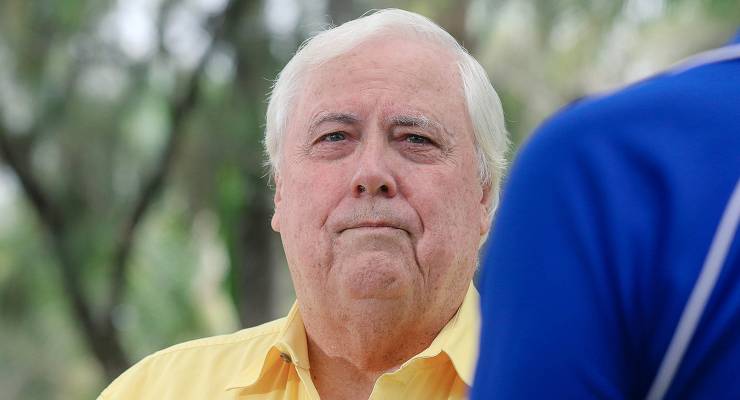
Fossil fuel titans like Santos, Hancock Prospecting, Adani and Mineralogy are among the corporations that donated millions to the Australian Labor Party, the Coalition and the United Australia Party (UAP) last financial year, intensifying calls from powerbroker Greens to tighten the weakest donation and disclosure laws in the country.
This morning the Australian Electoral Commission (AEC) released a tranche of data revealing exactly how much political parties and third parties spent leading up to the 2022 federal election, as well as the donations used to fund campaigns last financial year.
Among the heavy hitters are UAP founder Clive Palmer’s Queensland-based mining company, Mineralogy, which donated a staggering $116 million to the UAP ahead of the 2022 election, including two individual donations of $50 million and $30 million.
That means the UAP’s receipts total the highest yearly figure of any political party, smashing the party’s highly controversial 2019 total of $83.7 million.
Labor’s total donations were $124 million, with hefty chunks of money categorised under “other receipts” from the Minerals Council ($102,500) and energy giant Santos ($69,500).
The Liberals posted $106.7 million in donations and other receipts, and the Nationals reported $11.5 million, with donors including Adani Mining which gave $107,700 to the Queensland LNP, Gina Rinehart’s Hancock Prospecting which gave $24,500 to the Liberals, and Whitehaven Coal which donated $34,250 to the Liberal and National campaigns.
A slew of fossil fuel companies hedged their bets by spreading their donations across Labor, Liberal and the Nationals — including Beetaloo Basin gas fracking company Tamboran Resources ($200,000), gas producer Origin Energy ($11,480), Chevron ($93,090), Woodside ($109,930), and owner of Vales Point coal-fired power station Trevor St Baker ($120,249, including to the Liberal Democrats).
Overall the political duopoly got more than $2.3 million from fossil fuel sources ($1.4 million to Labor and more than $900,000 to the Coalition) — but $105 million declared by the major political parties had no identifiable source, up from $62 million in the previous year.
Still, that’s not the full picture. Acting legal director at the Human Rights Law Centre Alice Drury said many more millions in financial contributions to major parties were “obscured from public view entirely” because federal disclosure laws were riddled with holes.
“This situation is all perfectly legal under federal electoral laws, which are the weakest in the country,” Drury said. “We need greater transparency, of course, but that alone won’t change our politics. We also need caps on election spending and bans on large political donations altogether, as some states have done.”
Drury said the new data was a reminder that “big harmful industries are lurking in the halls of Australian Parliament, donating big and calling the shots”.
“This includes industries like tobacco, gambling and fossil fuels, which harm millions of Australians every year,” she said. “All parliamentarians who are serious about political integrity should support these reforms.”
It comes as the Greens — who hold a powerful 12 seats in the Senate — have intensified their campaign to cap federal political party donations to $1000 and ban fossil fuel companies from donating.
Greens Senator Larissa Waters said corporate donations were little more than “democracy for sale”, citing more than $230 million given to Labor and the Coalition in the past decade.
“With the Greens in the balance of power in the Senate, we have the opportunity to remove the influence of big money from politics once and for all,” Waters said. “Coal, gas and oil corporations don’t donate millions every year to the Liberals, Nationals and Labor because they’re huge fans of democracy — they do it because it gets results. Let’s call this what it is: legalised bribery.
“The influence of dirty donations on government decisions is why Australia has waited so long for stronger environmental protections and real action on climate change”.
The Greens are also calling for a rethink on donation disclosure. It should happen in real time, they said, with lower disclosure thresholds and better data.
Under the current system, voters have to wait up to 18 months before they can see donations to political parties.
It seems Labor is willing to listen. In a submission to a parliamentary inquiry into the 2022 election, Labor backed real-time disclosure and slashing the disclosure threshold from $15,200 to $1000 (though for 2021-22, the limit was $14,500 before indexation).
It would bring federal politics into line with state politics. In NSW and Queensland, the disclosure threshold is $1000, and in Victoria it’s $1080. In Queensland, Victoria and NSW, large donations to political parties (more than $6000) are prohibited.
Analysis from the Centre for Public Integrity, a non-profit group of former judges and anti-corruption campaigners, found the top 5% of donors made up three-quarters of nearly $1 billion in donations over the past 20 years. The top four spots were taken by Mineralogy Pty Ltd ($110,331,859), the Cormack Foundation ($63,644,555), Labor Holdings Pty Ltd ($62,360,236) and John Curtin House ($49,941,895).
In 2021, its research revealed that almost $1.5 billion in secret contributions had flowed to federal political parties since 1999.








There is no shortage of people who want donations limited to $1,000 and be reported in real time. Stop playing about with inquiries. Just do it. If there are other ideas which there are send them to an inquiry.
I suspect this enquiry ploy is a means to dodge criticism from the inside of Labor’s organisation, and deal with the issue of allowing union support. I don’t have a problem with something as clear and open as union support for a Labor party. (It is what it says on the box). If a business union (BCA of other) gives to the LP and is open about it, equally no problem.
But obscured funding has been so evidently a problem for so long, and so intrinsically linked with the lowering of faith in political process, that delaying tactics are just more cause for doubt about dirty money corrupting the game. Big test for Labor to walk in government the talk from opposition. I wish the Greens well, but fossil industry is as gambling industry or billionaires to me.
It will be interesting to monitor independents positions.
Actually….it is a big test for ALL Members of Parliament. A time to get out the copies of declarations to serve in the interests of electors and democracy, and not just those who paid for some campaign expenses.
Agree, but MPs do not declare to serve in the interests of electors. Under the requirement of the Constitution (section 42) they only swear allegiance to the monarch.
Indeed. I was thinking of the standard stump speech of the newly elected on election night, or first speech to Parliament before the Whip marks appear.
What’s the word for selling one’s favours? Ah yes, prostitution.
Exactly. No amount of shilly-shallying can hide this fact. When Dom Perignon had had enough of the gambling debacles and decided to do something about it, the money from the clubs to Labor spoke volumes via Chris, a volume far louder than the most amplified Voice to parliament. Almost certainly the Voice won’t get very far for the indigenous community as they don’t have a lazy billion or two to get what they REALLY want. But Australia’s oligarchs, and the overseas ones do. And don’t they make their prostitutes listen! And perform enthusiastically every time.
When Reformin’ Jim is out there pleasuring himself about “Values Based Capitalism”, what he actually means, is Donor Based Capitalism.
Negotiable virtue?
And people have the hide to call this ‘democracy’!! This description is nothing more than Orwellian ‘double-speak’.
Regrettably, I see no real prospect for change in the approach described here.
I really don’t know why I even bother casting a valid ballot paper. This whole thing is a sham.
Thank you for telling it how it is Emma. I hope that you didn’t get as depressed writing this article as I did reading it.
Political Parties are wedded to these Donations, and will not be keen to give them up.
It makes people wonder, “what do these Donators get for their generous donations to Political Party.
One of the biggest debates in Australian Politics at the moment is “the Voice”, with some protesting strongly that it will give Aboriginal people too much of a say with their Advice around Legislation. Even if this were true, which I don’t believe it is, it pales into insignificance with what “favors” these Political Donations achieve.
We may consider the donations generous but in comparison with the capital gains from political favours they’re minuscule. Nearly always. Except for Clive Palmer. He got a shocking result for his. However, just watch the pained reluctance displayed by MPs being pushed towards doing something against their donors’ interests. Wall-to-wall spin is the BEST we can usually expect.
Yes, the cheapest politicians in the world.
Yes I’ll bet far cheaper than any in the United States, Latin America or the Middle East. But they seem to be honest, as in, once bought they stay bought.
Spot on. Minerals Council ($102,500) and energy giant Santos ($69,500). For that amount, probably comparable to their executive travel allowances, you doubtless get better access to ministers than the public service and the opportunity to agenda set on matters like, the right to keep making profits from global warming, keeping taxes low, and getting new infrastructure for your products paid for by taxpayers. Maybe even some inside information about other countries, courtesy of our security services Favours potentially worth billions for a pittance.
Imagine if we had real time disclosure of donations AND real time access to pollies’ diaries.